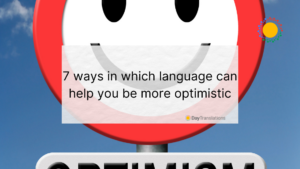You already know that learning a language is good for your resume, social skills and college application. But, did you know that learning a language can make you happier as well?
Seriously, hitting the books, working on your app, or taking your online classes might feel like a chore. But putting in the extra effort will pay dividends in the long run. Let’s take a closer look.
Related Post: 7 Brand-New Reasons You Need to Learn a Language
Learning a Language Improves Your Mental Health
According to research by the London School of Economics, good mental health is key to happiness. And guess what? Learning a language can improve your mental health, which has a direct impact on how happy you feel.
Because all the processing of words, grammar and syntax is one of the most complex functions your brain ever has to handle, you’re giving it a major boost each time you take a class.
You’re expanding your brain’s capacity by stuffing it with extra vocabulary and giving it the daily workout it needs to stay in tip-top shape.
Your Memory Gets Better
Elephants never forget, right? Well, neither do multilinguals and polyglots. With so many extra words and concepts to remember, it stands to reason that these people’s memories are enhanced from all that learning.
But that isn’t only when it comes to remembering verge conjugations or local colloquialisms. Studies have revealed that learning a language also improves the memory when it comes to other areas of life as well.
But how does remembering people’s names, birthdays, and telephone numbers make you happier? Well, in several ways, actually.
To start with, having a sharper memory will help keep your brain alert as you progress through life. You’ll be able to avoid being the family relation who repeats themselves at every gathering and the grandchildren steer clear of.
Having a good memory and recalling positive events from the past has also been shown to increase happiness and decrease anxiety about the future. Learning a language isn’t just about communicating with foreign speakers. You’re actually giving your body and mind a workout that will set you in good stead for life.
Related Post: 3 Advantages Students get by Learning a Foreign Language
Your Brain Stays Healthier for Longer
If you’ve ever had the misfortune of watching an ailing friend or relative struggle with dementia, you’ll be pleased to hear that learning a language can help ward off certain mental illness.
The jury isn’t completely in yet on why this is, but the average age for monolingual speakers to start showing signs of dementia is 71.4 years old. In bi and multilinguals, the number increases to 75.5.
Learning a language can keep your brain healthier for longer by increasing its alertness and capacity. Again, pretty handy if you don’t want to become the person small children run away from!
You Can Multitask With Greater Dexterity
Learning a language helps you improve your ability to multitask. Which means you’ll crunch through your workload quicker and free your mind for happy activities and thoughts.
When you can take on several jobs at once and organize your day easier, juggle kids with work and social life, you’ll be happier than your friends struggling with too many tasks.
You’ll also be more productive, efficient, and better at your job. Which means asking for a pay raise should be easier and you’ll have more money to go out and buy that new pair of shoes you’ve had your eye on. A little retail therapy never hurt anyone!
Related Post: Freelancers Listen Up! Top Tips For Staying Productive
You’re More Creative
Learning a language can make you more creative, as it increases your ability to innovate and come up with different ways of looking at and solving a problem.
Seeing as how science says that creative people are happier, learning a language gets extra points in this area as well.
You Get to Break Down Barriers
Day Translations is built on the importance of improving global communications and breaking down barriers. Learning a language helps you communicate with people from different countries, cultures and backgrounds.
Not only is learning a language a deeply satisfying voyage of self-improvement, but you’ll also discover so much more than just new words.
When you can really understand why Mexican people have such a strong concept of family, or how the Japanese feel about space, you’ll be happier. So many mysteries of the universe and political discord will suddenly make sense.
And let’s face it, if you’re learning a language through immersion, by actually going and living in the country of your choice, you’re going to have a few exciting parties to go to and some interesting experiences to tell!
You’ll also get eternal bragging rights and be the envy of your friends by being able to speak a whole new tongue that makes no sense to them at all.
So, if living healthier for longer, with a better memory, enjoying enhanced mental health and alertness aren’t reasons enough for learning a language; perhaps making your friends look dumb is incentive enough!
Whatever your motivation for learning a language, remember when you’re nose deep in your next assignment, you might not feel like it, but learning a language is making you happier – today and for the rest of your life.














Sorry, the comment form is closed at this time.